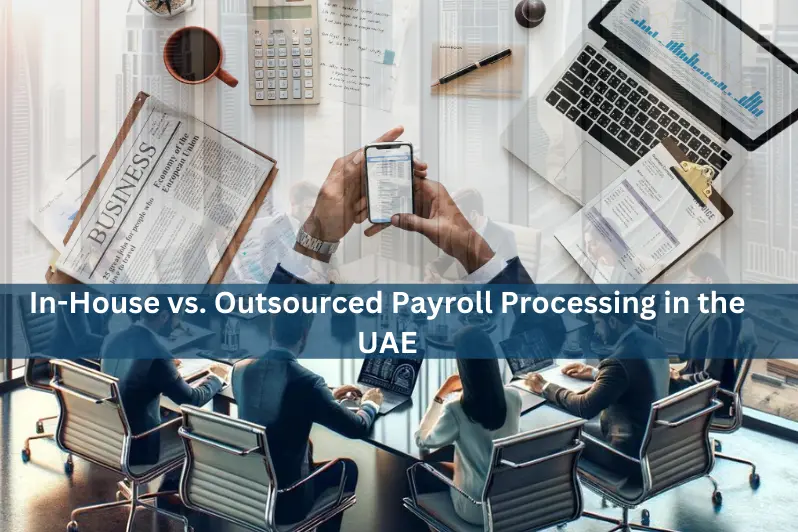Payroll management may be difficult and time-consuming for companies in the United Arab Emirates. Organizations must decide whether to process payroll internally or use a third-party provider. In this article, we will examine the pros and cons of In-House Payroll Processing Vs Outsourcing processing for businesses in the UAE.
In-House Payroll Processing Vs Outsourcing: Pros and Cons
-
In-House Processing
When a business handles its payroll in-house, it uses its own resources and employees to process payroll, file taxes, and ensure compliance. -
In-House Payroll Pros and Cons
The following are some of the advantages and disadvantages of in-house payroll processing:
Pros:
- Control and Customization: One benefit of handling payroll in-house is the ability to tailor the process to each company’s unique requirements and preferences.
- Confidentiality and Security: Second, data security and confidentiality are issues that can be alleviated by maintaining payroll records in-house.
- Immediate Response: By handling payroll in-house, companies may quickly resolve any queries or problems that may arise, eliminating the need to rely on third parties.
Cons:
- Resource Intensive: First, it takes a lot of resources, such as trained employees, software, and continuing education to keep up with regulations, to handle payroll in-house.
- Costs and Compliance Risks: If a company doesn’t have the knowledge or capacity to handle processing in-house, it might end up spending more money and putting itself at greater risk of noncompliance.
- Time-Consuming: Internal payroll processing takes time and energy that can be taken away from other important business tasks.
When a business outsources its payroll processing to a third party, that business is no longer responsible for processing employee paychecks, deducting taxes and other mandatory deductions, or ensuring that the business complies with all applicable labor laws and regulations.
Payroll Outsourcing Pros and Cons
The following are some of the advantages and disadvantages of payroll outsourcing:
Pros:
- Access to Expertise: First, you have access to professional knowledge when you outsource your payroll processing. This means that your payroll will be processed accurately and in compliance with all regulations.
- Cost Savings: Outsourcing payroll allows organizations to cut down on expenses like salary, benefits, and training that come with having an in-house payroll department.
- Time Efficiency: By removing the burden of payroll administration from organizations, outsourcing enables them to concentrate on their core competencies while saving time and resources.
Cons:
- Loss of Control: One potential drawback of outsourcing payroll to a third party is the potential loss of control that businesses may experience.
- Confidentiality Concerns: There are valid worries regarding the security and confidentiality of employee data when it is shared with an outside entity.
- Dependency on Service Provider: When a company relies on an external source for payroll processing, it loses direct control over any difficulties or delays that may arise.
Comparison of In-house Payroll Processing vs Outsourcing
| Factor | In-house Payroll Processing | Payroll Outsourcing |
|---|---|---|
| Control | High | Low |
| Customization | High | Low |
| Data Security | High | Medium |
| Cost | High | Low |
| Time | High | Low |
| Compliance | Medium | High |
| Expertise | Medium | High |
| Dependence | Low | High |
In-house payroll processing vs outsourcing salary: Pros and Cons
When it comes to salaries, businesses need to consider the cost of managing payroll in-house vs outsourcing. It can be costly for organizations to employ and train employees to handle payroll processing in-house. As a counterpoint, payroll outsourcing in uae often results in lower overall costs due to suppliers’ ability to take advantage of economies of scale and divide up their services among several clients. But before hiring an outsourcing provider, companies should think about how much the services will cost and whether or not they will be worth it.
In-house payroll processing vs outsourcing cost: Pros and Cons
In addition to salaries, businesses need to consider the overall cost of managing payroll in-house vs outsourcing. It can be expensive to do payroll in-house because of the cost of software, tools, training, and staff fees. As a counterpoint, payroll outsourcing often results in lower overall costs due to suppliers’ ability to take advantage of economies of scale and divide their services among several clients. Nevertheless, companies should check the provider’s reputation and reasonableness of service pricing before making a final decision.
FAQs
What are the primary considerations for businesses in the UAE when deciding between payroll outsourcing and in-house processing?
A: When assessing payroll processing choices, businesses should think about things like cost, control, secrecy, expertise, and how efficient it is.
How can businesses address the confidentiality concerns associated with payroll outsourcing?
A: Picking a reliable payroll outsourcing service with strong data security safeguards is one way for businesses to deal with confidentiality problems.
Q: What are the potential risks of in-house payroll processing in the UAE?
A: In-house processing risks greater costs, regulatory issues, and the need to invest in resources and training to retain competent employees.
Conclusion
In conclusion, UAE companies must carefully consider the pros and cons of In-House Payroll Processing vs. outsourcing. Companies may make a well-informed decision that supports their long-term aims by reflecting on their unique requirements and taking into account the benefits and drawbacks discussed in this article.



